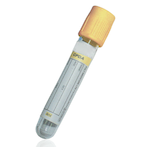Alpha-1-Antitrypsin (A1AT)
Specimen Volume
1mL blood (~250uL sample).Specimen Transport
Not applicableSample Preparation
Turnaround Time
2 daysSample Processing In Laboratory
No special requirements. Centrifuge and store at 4°C.Sample Stability
3 months at 2-8°C.General Information
Alpha-1-Antitrypsin is a glycoprotein synthesised in hepatocytes and is quantitatively the most important proteinase inhibitor (Pi) in serum and plasma. It specifically inactivates serine proteases (eg. Trypsin, chymotrypsin, collagenase, leucocyte elastase, plasmin and thrombin) with which it reversibly forms an enzyme-indicator complex.
Acute hereditary alpha-1-Antitrypsin deficiency is suspected in cases of neonatal hepatitis accompanied by progressive liver cirrhosis in early childhood. It is also suspected when severe pulmonary emphysema occurs in adults due to the prevalence of leucocyte elastase, which can lead to unrestrained proteolytic degradation of the pulmonary parenchymal cells.
Genetic variants of A1AT are characterised by their different electrophoretic mobilties i.e. M, S or Z. Z and S variants have decreased synthesis of A1AT. S forms produce 60-80% of normal and Z produces only 15% of normal. Normal range is age related.
Analysis is carried out at the Heartlands Hospital site only. Samples sent to the QEHB laboratory will be forwarded onto the Heartlands laboratory for analysis.
Patient Preparation
None
Notes
No significant interference from haemolysis, icterus, or lipaemia. Elevated oestrogen levels (oral contraceptives, 3rd trimester of pregnancy) give rise to false positive results
Reference Range
Adult range 1.1 - 2.1 g/L.
Age related ranges are available by contacting the Immunology department (Heartlands Hospital).
Specifications
-
EQA Status:
UK NEQAS for Specific Proteins scheme
- EQAS Scheme: Yes








